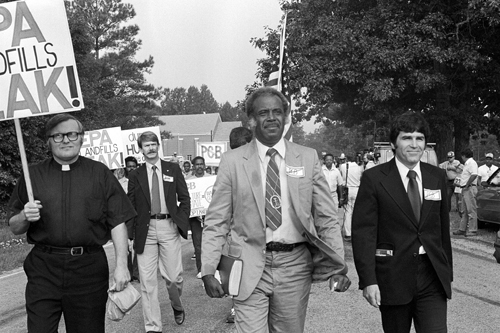Movement Theology: Leon White Reflects Back on a Movement’s Start
 On September 15th of 1982, more than 125 people gathered at Coley Springs Baptist Church in Warren County, North Carolina. They had gathered to march and physically prevent dump trucks from delivering the first shipments of toxic waste to a newly created landfill. Ultimately, the efforts of that day would spark a six week civil disobedience campaign that would awaken the conscience of a nation and kick-start the Environmental Justice Movement.
On September 15th of 1982, more than 125 people gathered at Coley Springs Baptist Church in Warren County, North Carolina. They had gathered to march and physically prevent dump trucks from delivering the first shipments of toxic waste to a newly created landfill. Ultimately, the efforts of that day would spark a six week civil disobedience campaign that would awaken the conscience of a nation and kick-start the Environmental Justice Movement.
Among the leaders of the protest was the Rev. Leon White. At the time, White served as a regional field director for the United Church of Christ Commission for Racial Justice. Along with local organizer Dollie Burwell and others, he was arrested on the first day of demonstrations. Ultimately, more than 520 would be arrested over the course of the six weeks.
At the age of 85, White recently reflected back on the start of the movement and some of the lessons learned. His remarks displayed an attentiveness to how one copes with the ups and downs that one inevitably experiences. He declared that the most important part of a movement occurs after the crowds go away. It is in that moment that one has to be “persistent in pushing for justice to flow down like water and righteousness like a mighty stream.” For White, this meant being a perpetual thorn in the side of those in power.
 Some of White’s greatest insights pertain to theology and how one copes with the uncertainties of what to do when challenging injustice. In giving advice for young persons who want to become involved in addressing environmental issues today, he offered a series of reflections that are worth quoting at length:
Some of White’s greatest insights pertain to theology and how one copes with the uncertainties of what to do when challenging injustice. In giving advice for young persons who want to become involved in addressing environmental issues today, he offered a series of reflections that are worth quoting at length:
If you have the call, do it. As they say, if you make one step, the Lord will make two or three. You don’t get involved because you know what you are doing. You get involved because you have a zeal to try to make the wrong right. That’s all. You don’t know how you are going to do it. You just challenge the wrong, and somehow it works out. You don’t have the answer. You seek for the answer. You seek for it, and you don’t know what you are doing, but you have the strength, the power, and the knowledge to do it, but you don’t know it, because you never put it to practice before. Our cup runneth over by doing.
Our ancestors just did it, and they have a song they would sing, “The Lord Will Make a Way Somehow.” They didn’t know the way, but they believed that the way was in them, but they had to step out on faith to make it become a reality.
Sometimes you just do. Not because you see it. You just do, and it always blooms into a more beautiful flower than you ever anticipated. The advantage of getting old is that you can see what the Lord can do.
Read more about the origins of environmental justice movement, Dollie Burwell, or the Toxic Wastes and Race Report that came out of the movement.
Related News
Growing Weary
In December 1964 during a speech in Harlem, Fannie Lou Hamer declared: “And you can always...
Read MoreOur Moral Center
“We've got about 350,000 people who are dying prematurely from the burning of fossil fuels...
Read MoreChapter Resources
Check out the latest resources for our local Climate Hope Affiliates: December Monthly...
Read More

